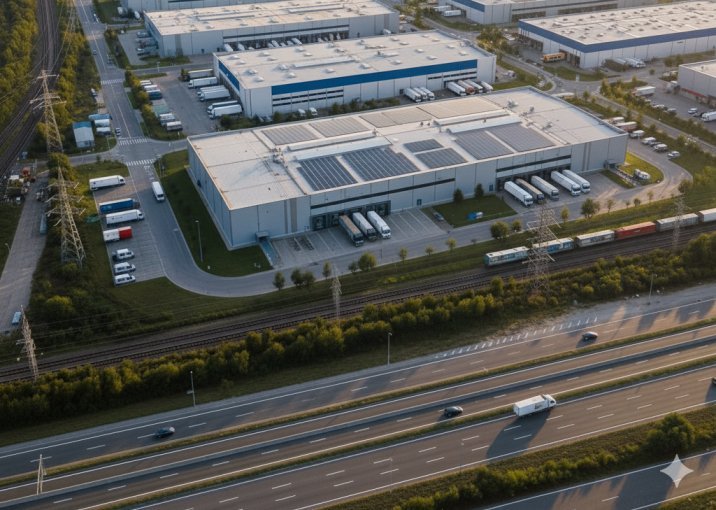Choosing the right type of Industrial Land is one of the most critical decisions for investors, manufacturers, and logistics businesses. Whether you plan to build a production unit or set up a warehouse, understanding the distinction between Freehold and Leasehold Industrial Land helps you make a secure and profitable investment.
In India, both ownership types are common in industrial zones, but each has unique legal, financial, and operational implications. Let’s explore how they differ and what every investor should know before making a decision.
Understanding the Concept of Industrial Land Ownership
Before diving into the comparison, it’s important to understand what Industrial Land represents in the real estate ecosystem.
Industrial Land is land allocated for manufacturing, warehousing, or logistics activities, usually located in special industrial zones or parks. These lands are regulated by development authorities and have specific zoning laws, infrastructure setups, and land-use conditions.
Investors usually have two types of ownership options:
- Freehold Industrial Land
- Leasehold Industrial Land
Each comes with different rights and obligations.
What Is Freehold Industrial Land?
Freehold Industrial Land gives the buyer full ownership rights. Once purchased, the investor owns the land and the structure built on it indefinitely.
This means:
- The land can be sold, leased, or transferred without restriction.
- Ownership remains valid until sold voluntarily.
- It can be inherited or mortgaged.
Key Benefits of Freehold Industrial Land
- Complete Ownership: The buyer has total control over the property.
- High Market Value: Freehold properties often appreciate faster due to ownership stability.
- Easy Financing: Banks and financial institutions prefer freehold assets for industrial loans.
- Long-Term Security: No need to renew leases or deal with government authorities periodically.
However, freehold Industrial Land usually comes at a higher upfront cost, and availability is limited in prime industrial zones.
What Is Leasehold Industrial Land?
Leasehold Industrial Land is owned by the government or a development authority and leased to the investor for a fixed period, typically 30 to 99 years.
The buyer (lessee) gets possession and usage rights but not permanent ownership. After the lease term ends, the land reverts to the authority unless renewed.
Key Features of Leasehold Industrial Land
- Ownership remains with the lessor (government or private developer).
- The lessee must pay ground rent or lease premium annually.
- Transfer or sub-letting often requires official approval.
Advantages of Leasehold Industrial Land
- Lower Initial Cost: Cheaper than freehold plots, ideal for startups or SMEs.
- Government-Backed Projects: Often part of well-planned industrial parks with ready infrastructure.
- Easier Allotment: Many state governments offer leasehold plots through industrial development corporations (e.g., HSIIDC, MIDC, RIICO).
Disadvantages of Leasehold Industrial Land
- Limited ownership rights.
- Renewal uncertainty after lease expiry.
- Restrictions on transfer, resale, or mortgage.
- Lesser appreciation compared to freehold properties.
Freehold vs Leasehold Industrial Land – A Detailed Comparison
| Criteria | Freehold Industrial Land | Leasehold Industrial Land |
| Ownership | Complete, perpetual ownership | Limited to lease period |
| Transfer Rights | Can sell, lease, or mortgage freely | Requires authority approval |
| Cost | Higher initial investment | Lower cost, annual lease rent |
| Financing | Easier to get loans | Sometimes restricted |
| Tenure | Permanent | 30–99 years |
| Resale Value | High | Moderate |
| Maintenance Control | Fully controlled by owner | Often shared or regulated |
| Legal Security | Strong | Subject to lease conditions |
Legal and Financial Aspects of Industrial Land
When buying Industrial Land, investors must assess title clarity, land use permissions, and compliance with industrial zoning laws.
For leasehold land, verify:
- Lease agreement terms (duration, renewal, transfer rights)
- Ground rent obligations
- Maintenance and utility responsibilities
For freehold land, check:
- Title deed ownership
- Encumbrance certificate
- Land use approvals
Due diligence ensures your Industrial Land investment remains safe and compliant.
Which Is Better for Investors — Freehold or Leasehold Industrial Land?
The choice depends on investment goals, capital budget, and business model.
If you prefer long-term control and asset appreciation:
Choose Freehold Industrial Land.
It’s ideal for investors planning to establish a permanent manufacturing base or long-term industrial operation.
If you’re cost-conscious or seeking flexible setup options:
Opt for Leasehold Industrial Land.
It suits startups, logistics companies, or export units looking for short- to mid-term operational bases.
For instance, M3M Industrial Plots Sector 9 Manesar Gurgaon provides freehold industrial plots in a rapidly developing hub — offering high returns, ready infrastructure, and flexible plot configurations.
Government Policies and Allotment of Industrial Land
Different Indian states have their own industrial policies for allotting land to investors. Development authorities like:
- HSIIDC (Haryana)
- MIDC (Maharashtra)
- RIICO (Rajasthan)
offer both freehold and leasehold options based on project type and location.
Understanding these policies can help investors benefit from tax incentives, stamp duty exemptions, and infrastructure support.
Importance of Location in Industrial Land Investment
Location plays a pivotal role in Industrial Land investment. Plots near highways, ports, or urban centers offer better logistics efficiency and workforce accessibility.
Industrial hubs like Manesar, Sohna, and Bhiwadi are currently among the most promising due to robust connectivity and modern infrastructure.
Projects such as M3M Industrial Plots Sector 9 Manesar combine premium location advantages with well-developed amenities, ideal for both manufacturers and logistics companies.
Taxation and Compliance for Industrial Land Owners
Freehold and leasehold properties attract different tax implications:
- Freehold: Owners pay property tax and capital gains tax upon sale.
- Leasehold: Lessees may pay annual ground rent and renewal fees.
Compliance with environmental laws, factory licensing, and local development regulations is essential for both ownership types.
Future Trends in Industrial Land Investment
The Indian industrial real estate market is witnessing strong growth due to:
- Rising e-commerce and logistics demand.
- Make in India and Production Linked Incentives (PLI).
- Development of industrial corridors and smart cities.
Investors are increasingly favoring freehold Industrial Land for long-term value creation, while leasehold options remain popular for government-backed infrastructure projects.
For broader real estate insights and market trends, visit official website — a trusted source for industrial and commercial property updates.
Pros and Cons Summary
Freehold Industrial Land
✅ Full ownership
✅ High appreciation potential
✅ Easy financing
❌ High initial cost
❌ Limited supply in prime locations
Leasehold Industrial Land
✅ Affordable entry
✅ Easier allotment in industrial parks
✅ Suitable for short-term operations
❌ Renewal uncertainty
❌ Transfer restrictions
Expert Tips Before Buying Industrial Land
- Verify ownership documents and land use classification.
- Inspect the site for accessibility, soil type, and drainage.
- Understand the local master plan and infrastructure development.
- Negotiate clearly on lease terms or sale deeds.
- Consult legal experts to ensure compliance with industrial norms.
Conclusion — Making the Right Investment Decision
Choosing between Freehold and Leasehold Industrial Land depends on your investment horizon, capital, and business objectives.
If you want full control and long-term ownership, freehold is ideal. But if you seek cost-effective entry with flexibility, leasehold may work better.
Industrial hubs like Manesar and Gurgaon offer both options with world-class infrastructure and strategic connectivity — making them top destinations for manufacturing and logistics investments.
So, whether you’re an entrepreneur or investor, understanding these distinctions ensures you make an informed and profitable Industrial Land purchase.





